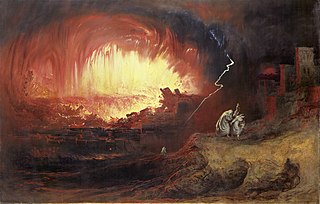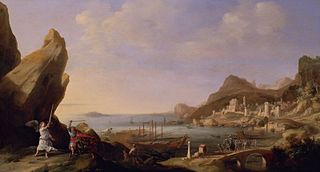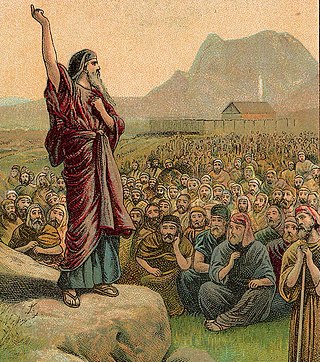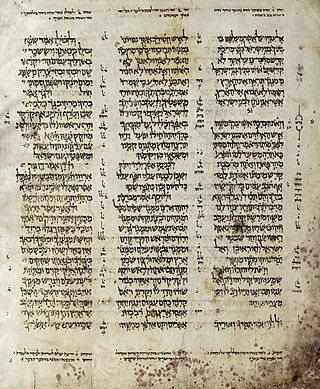Related Research Articles

Isaiah, also known as Isaias or Esaias, was the 8th-century BC Israelite prophet after whom the Book of Isaiah is named.

Balaam is a diviner in the Torah (Pentateuch) whose story begins in Chapter 22 of the Book of Numbers. Ancient references to Balaam consider him a non-Israelite, a prophet, and the son of Beor. King Balak of Moab offered him money to curse Israel, but Balaam blessed the Israelites instead, as dictated by God. Nevertheless, he is reviled as a "wicked man" in both the Torah and the New Testament. According to the Book of Revelation, Balaam told King Balak how to get the Israelites to commit sin by enticing them to copulate with foreign women and worship idols. The Israelites fell into transgression due to these traps and God unleashed a deadly plague upon them as a result.

Abraham was a prophet and messenger of God according to Islam, and an ancestor to the Ishmaelite Arabs and Israelites. Abraham plays a prominent role as an example of faith in Judaism, Christianity, and Islam. In Muslim belief, Abraham fulfilled all the commandments and trials wherein God nurtured him throughout his lifetime. As a result of his unwavering faith in God, Abraham was promised by God to be a leader to all the nations of the world. The Quran extols Abraham as a model, an exemplar, obedient and not an idolater. In this sense, Abraham has been described as representing "primordial man in universal surrender to the Divine Reality before its fragmentation into religions separated from each other by differences in form". Muslims believe that the Kaaba in Mecca was built by Abraham and his son Ishmael as the first house of worship on earth. The Islamic holy day 'Eid ul-Adha is celebrated in commemoration of Abraham's willingness to sacrifice his son on God's command, as well as the end of the Hajj pilgrimage to the Kaaba.

The Messiah in Judaism is a savior and liberator figure in Jewish eschatology, who is believed to be the future redeemer of the Jewish people. The concept of messianism originated in Judaism, and in the Hebrew Bible a messiah is a king or High Priest of Israel traditionally anointed with holy anointing oil. However, messiahs were not exclusively Jewish, as the Hebrew Bible refers to Cyrus the Great, king of the first Persian empire, as a messiah for his decree to rebuild the Jerusalem Temple.

Ishmael was the first son of Abraham, the common patriarch of the Abrahamic religions through his wife Sara's handmaiden Hagar. According to the Genesis account, he died at the age of 137.

Shimon bar Yochai or Shimon ben Yochai, also known by the acronym Rashbi, was a 2nd-century tannaitic sage in ancient Judea. He was one of the most eminent disciples of Rabbi Akiva. The Zohar, a 13th century foundational work of Kabbalah, is ascribed to him by Kabbalistic tradition.

Bereshit, Bereishit, Bereshis, Bereishis, or B'reshith is the first weekly Torah portion in the annual Jewish cycle of Torah reading. The parashah consists of Genesis 1:1–6:8.

Vayeira, Vayera, or Va-yera is the fourth weekly Torah portion in the annual Jewish cycle of Torah reading. It constitutes Genesis 18:1–22:24. The parashah tells the stories of Abraham's three visitors, Abraham's bargaining with God over Sodom and Gomorrah, Lot's two visitors, Lot's bargaining with the Sodomites, Lot's flight, the destruction of Sodom and Gomorrah, how Lot's daughters became pregnant by their father, how Abraham once again passed off his wife Sarah as his sister, the birth of Isaac, the expulsion of Hagar, disputes over wells, and the binding of Isaac.

Chayei Sarah, Chaye Sarah, Ḥayye Sarah, or Ḥayyei Sara, is the fifth weekly Torah portion in the annual Jewish cycle of Torah reading. It constitutes Genesis 23:1–25:18. The parashah tells the stories of Abraham's negotiations to purchase a burial place for his wife Sarah and his servant's mission to find a wife for Abraham's son Isaac.

Vayeshev, Vayeishev, or Vayesheb is the ninth weekly Torah portion in the annual Jewish cycle of Torah reading. The parashah constitutes Genesis 37:1–40:23. The parashah tells the stories of how Jacob's other sons sold Joseph into captivity in Egypt, how Judah wronged his daughter-in-law Tamar who then tricked him into fulfilling his oath, and how Joseph served Potiphar and was imprisoned when falsely accused of assaulting Potiphar's wife.

Vayigash or Vaigash is the eleventh weekly Torah portion in the annual Jewish cycle of Torah reading. It constitutes Genesis 44:18–47:27. In the parashah, Judah pleads on behalf of his brother Benjamin, Joseph reveals himself to his brothers, Jacob comes down to Egypt, and Joseph's administration of Egypt saves lives but transforms all the Egyptians into bondmen.

Beshalach, Beshallach, or Beshalah is the sixteenth weekly Torah portion in the annual Jewish cycle of Torah reading and the fourth in the Book of Exodus. It constitutes Exodus 13:17–17:16. In this parashah, Pharaoh changed his mind and chased after the Israelites, trapping them at the Sea of Reeds. God commanded Moses to split the sea, allowing the Israelites to escape, then closed the sea back upon the Egyptian army. The Israelites also experience the miracles of manna and clean water. And the Amalekites attacked, but the Israelites were victorious.

Yitro, Yithro, Yisroi, Yisrau, or Yisro is the seventeenth weekly Torah portion in the annual Jewish cycle of Torah reading and the fifth in the Book of Exodus. The parashah tells of Jethro's organizational counsel to Moses and God's revelation of the Ten Commandments to the Israelites at Mount Sinai.

Tazria, Thazria, Thazri'a, Sazria, or Ki Tazria' is the 27th weekly Torah portion in the annual Jewish cycle of Torah reading and the fourth in the Book of Leviticus. The parashah deals with ritual impurity. It constitutes Leviticus 12:1–13:59. The parashah is made up of 3,667 Hebrew letters, 1,010 Hebrew words, 67 verses, and 128 lines in a Torah Scroll.

Balak is the 40th weekly Torah portion in the annual Jewish cycle of Torah reading and the seventh in the Book of Numbers. In the parashah, Balak son of Zippor, king of Moab, tries to hire Balaam to curse Israel, Balaam's donkey speaks to Balaam, and Balaam blesses Israel instead. The parashah constitutes Numbers 22:2–25:9. The parashah is made up of 5,357 Hebrew letters, 1,455 Hebrew words, 104 verses, and 178 lines in a Torah Scroll.

Ahijah the Shilonite was a Levite prophet of Shiloh in the days of Solomon, as mentioned in the Hebrew Bible's First Books of Kings. Ahijah foretold to Jeroboam that he would become king.

Isaiah 53 is the fifty-third chapter of the Book of Isaiah in the Hebrew Bible or the Old Testament of the Christian Bible. This book contains the prophecies attributed to the prophet Isaiah and is one of the Nevi'im. Chapters 40 to 55 are known as "Deutero-Isaiah" and date from the time of the Israelites' exile in Babylon.

Va'etchanan is the 45th weekly Torah portion in the annual Jewish cycle of Torah reading and the second in the Book of Deuteronomy. It comprises Deuteronomy 3:23–7:11. The parashah tells how Moses asked to see the Land of Israel, made arguments to obey the law, recounted setting up the Cities of Refuge, recited the Ten Commandments and the Shema, and gave instructions for the Israelites' conquest of the Land. The parashah is made up of 7,343 Hebrew letters, 1,878 Hebrew words, 122 verses, and 249 lines in a Torah Scroll. Jews in the Diaspora generally read it in late July or August.

Nitzavim, Nitsavim, Nitzabim, Netzavim, Nisavim, or Nesabim is the 51st weekly Torah portion in the annual Jewish cycle of Torah reading and the eighth in the Book of Deuteronomy. It comprises Deuteronomy 29:9–30:20. In the parashah, Moses told the Israelites that all the people stood before God to enter into the covenant, violation of which would bring on curses, but if they returned to God and heeded God's commandments, then God would take them back in love and bring them together again from the ends of the world. Moses taught that this Instruction was not beyond reach, and Moses put before the Israelites life and death, blessing and curse, and exhorted them to choose life by loving God and heeding the commandments.

V'Zot HaBerachah, VeZos HaBerachah, VeZot Haberakha, V'Zeis Habrocho, V'Zaus Haberocho, V'Zois Haberuchu, Wazoth Habborocho, or Zos Habrocho is the 54th and final weekly Torah portion in the annual Jewish cycle of Torah reading and the 11th and last in the Book of Deuteronomy. It constitutes Deuteronomy 33:1–34:12. The parashah sets out the farewell Blessing of Moses for the 12 Tribes of Israel and concludes with the death of Moses.
References
- ↑ Neil, Bronwen (2021-01-14). Dreams and Divination from Byzantium to Baghdad, 400-1000 CE. Oxford University Press. ISBN 978-0-19-887114-9.
Further reading
- Bernard Lewis "An Apocalyptic Vision of Islamic History" London: British School of Oriental and African Studies, 1950.